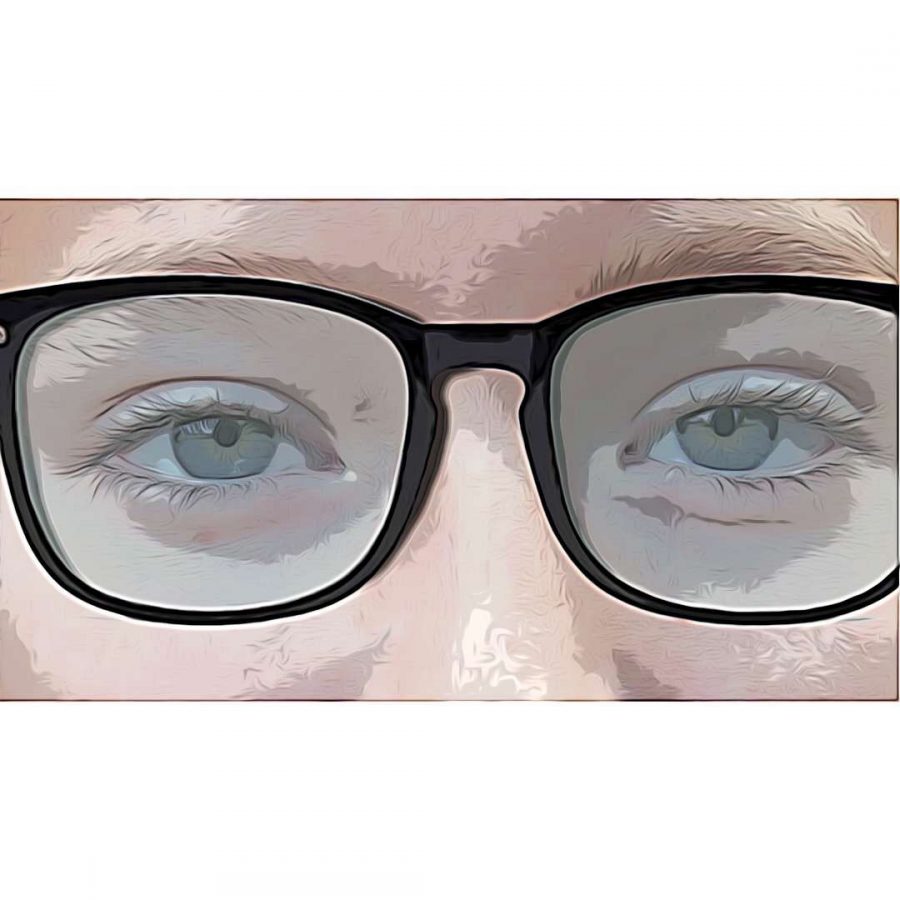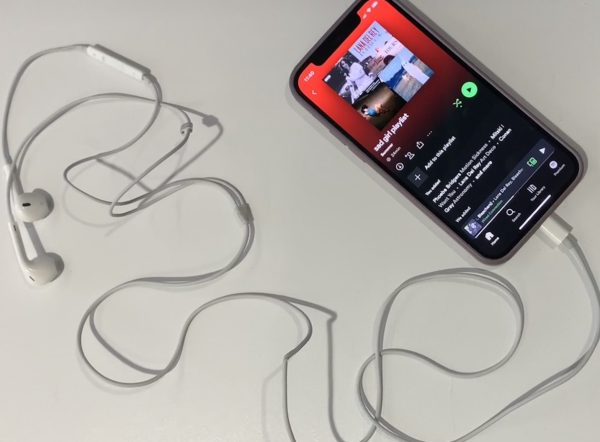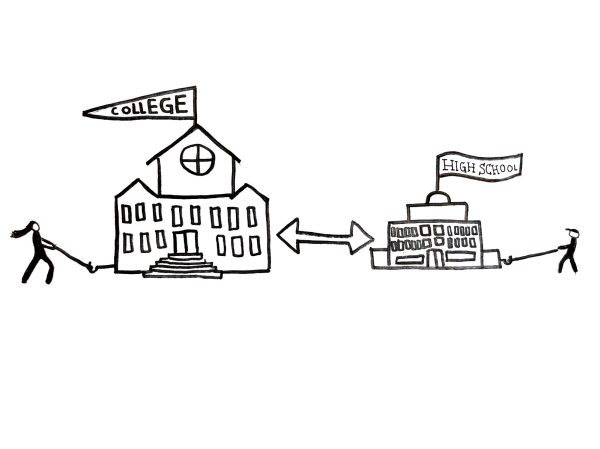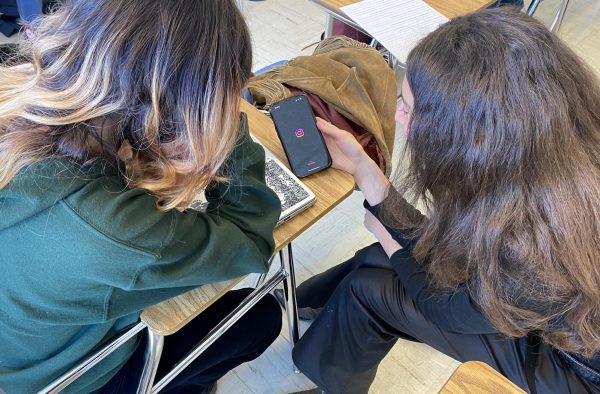Blue Light Glasses: Real Relief or Simply Style?
Whether it’s to lessen eye strain or simply add an accessory to an outfit, everyone is sporting their new blue light glasses.
Over the last few months, I have noticed many of the people around me have begun sporting a new pair of glasses. As someone who wears glasses in order to have clear vision, it was to my surprise to learn that most of these people have no prescription in their lenses at all. So why did they need them? They told me that along with looking really cute with their outfits, they had the benefit of filtering out blue light.
Blue light is merely a wavelength on the color spectrum—most notably emitted from digital devices—and many people have reported that prolonged exposure can cause aggravation to your eyes. This has caused the blue light glasses industry to take off in recent years and its market size is projected to increase from $24 million in 2020 to $38 million by 2026. The argument for its growing popularity is that it restores digital contrast on your computer screen by filtering out the blue light component and as a result, lessens the strain on your eyes. In a review, Gina Tomaine swears that they made it so she could work longer hours and her “eyes felt more rested at the end of the day…and looked visibly less red and tired.”
While the testimony of certain individuals shows promising relief for those that wear them, these glasses are a newer product and research does not seem to favor them one way or another. Ophthalmologist Rishi Singh says that it is common for people to feel a strain on their eyes after an extended period of time in front of a screen, however, it doesn’t necessarily stem from blue light exposure. Instead, it comes from computer vision syndrome (CVS).
Dr. Singh explains that “when we stare at a digital screen or device for too long, we’re not blinking very often, which causes the cornea to become dry and irritated.” He reports that the best way to combat this is to simply look up from your screen every 20 minutes and focus on something that is far away. This process is also called the 20-20-20 rule: every 20 minutes, look at something 20 feet away, for 20 seconds. This allows your eyes to relax and lessens irritation. This entails that overusing your devices, not blue light, is the cause of discomfort to your eyes.
On the other hand, blue light glasses have been proven to increase sleep. Exposure to light, specifically blue light, discourages the production of melatonin. Melatonin is important to the body as it is a critical hormone that helps your brain respond to the dark and contributes to your circadian rhythm, therefore, helping your sleep cycle. Christopher M. Barnes at the Harvard Business Review conducted a study where he found that those wearing blue light filtering glasses for a period of time before bed reported to sleep much better than those that wore a pair with no light filtration. In the report, the test subjects said they felt much more rested and even had increased productivity in their workspaces.
With this, it is also important to note that blue light is emitted everywhere—most prominently by the sun. So if blue light is really what causes you discomfort, wearing a pair of glasses during work time probably won’t cure you. Still, Susan Primo, an optometrist at Emory University says, “If you want to wear them and find some benefits, that’s fine.” Just be wary that all your purchase may buy you is a new accessory and the placebo effect.
So while blue light glasses aren’t a total sham, people just seem to be buying them for seemingly wrong reasons. They haven’t proven to have a particular impact on lessening digital strain, but they do show promising results for improving sleep quality.
One way or another, the message that these glasses have sent to consumers has gotten many hooked on their perceived benefits—and styling perks—including my family and friends. Like my peers, I too have decided to invest in blue light glasses and will be getting an upgrade to my prescription ones. While there isn’t concrete evidence in favor of their impact on reducing digital strain, your purchase can be validated by the potential of getting a better night’s sleep. And even if the effects may prove to be somewhat of a placebo in the end, at least you will have gotten a fashionable pair of glasses out of the experience.

Ruby, a senior at Boulder High, is a first-year member of the Owl and hopes to explore the world of journalism through the eyes of a writer. While she isn't new to this style of writing, she has taken many years off from it and is excited to dive back in. Over the last year, The Owl caught her attention as she continued to read the funny, informative, or controversial articles her classmates had produced the year before. She is thrilled to take on stories in multiple categories of the newspaper and find her strengths in each. While she enjoys writing, you can also find Ruby biking over a mountain, kicking a ball around a field, bingeing a new TV series, or torturing her beloved siblings (they...







Global Eyes • Jun 21, 2022 at 1:19 am
Great guide! I like the info provided by you about glasses frames. niceBlue light Glasses
Caitlin Rogers • Dec 14, 2020 at 5:41 pm
I would have to agree with you, Ruby. Lots of my friends have gotten blue light glasses and swear they’ve seen improvement. Interested in the outcomes, I did my own research as well and found that there isn’t a lot of evidence to support its benefit. With the 20-20-20 rule, we have a joke around my house of looking away for 20 minutes instead of 20 seconds (highly effective, I know). I like how you dive into the pros as well as the cons of the glasses instead of being biased and only providing evidence for one side. This is a very informative article and I will use this as a source to maybe get a pair of my own to see how they work!
Jonathan Wright • Dec 2, 2020 at 2:08 pm
I found this very informative. I purchased one set of my lenses with blue light filtering and never really noticed much of a difference. I’ve also thought if this is so important, why don’t computer screen manufacturers build the feature in. Now I know. Thanks for the 20-20-20 rule— definitely using that.